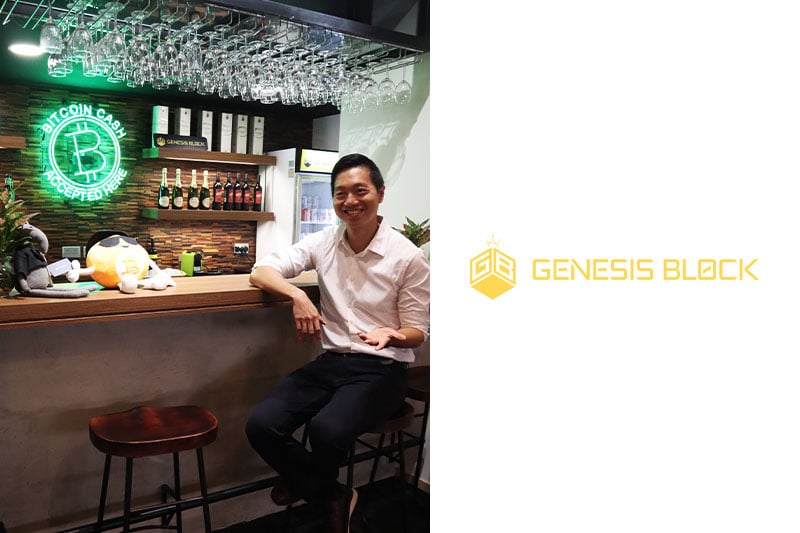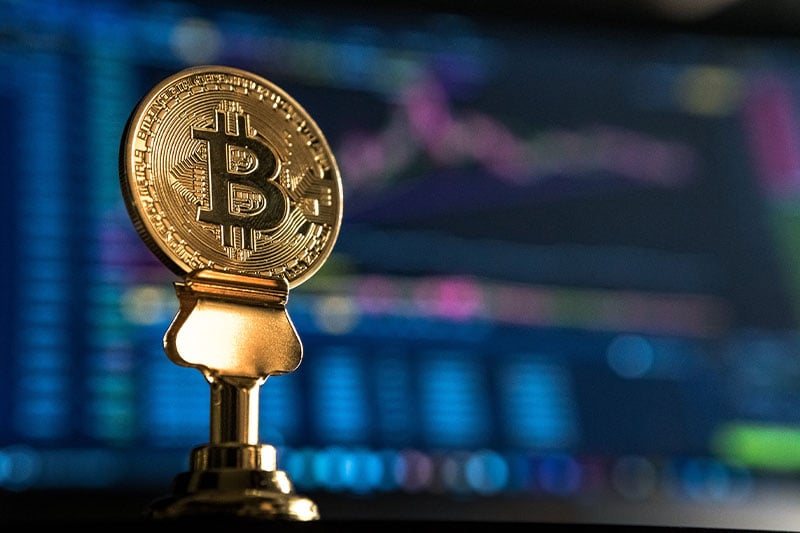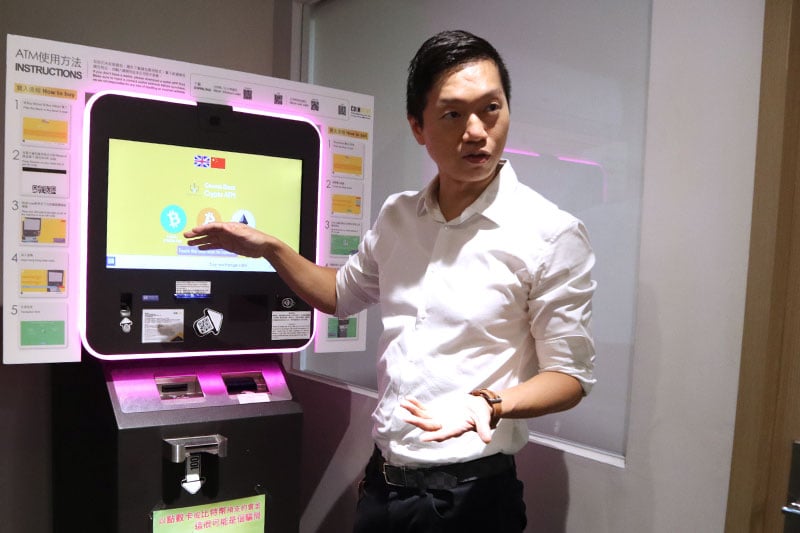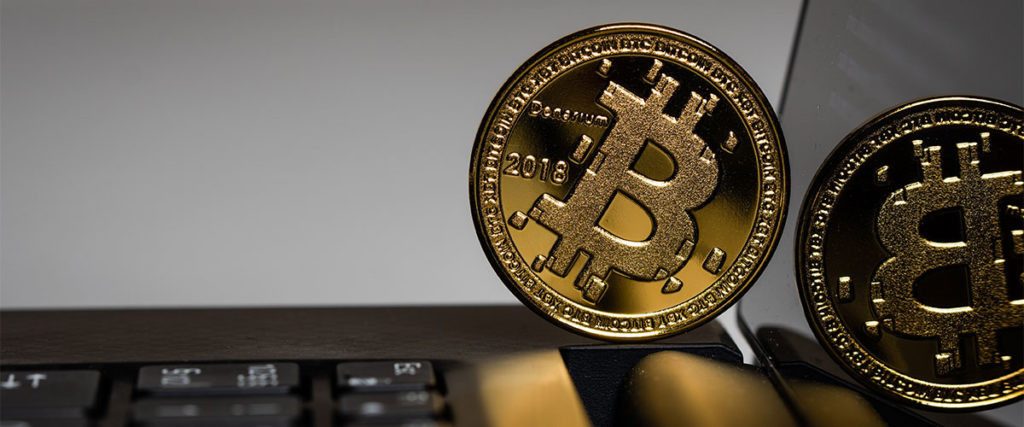Cryptocurrency. It’s a term we’ve all heard, but few understand. Some say it’s the way of the future. Others associate it with criminal, or even terrorist, activity. We met with crypto expert Wincent Hung to ask him the basics anyone should know before deciding to enter the complex and somewhat baffling world of cryptocurrency.
It was whilst running his own hostel in Hong Kong’s Wan Chai (‘Check Inn HK’) that Wincent, a former Ernst & Young auditor, first recognised the potential of cryptocurrency. By 2016, he was readily accepting Bitcoin from his hostel guests to settle payments, making him one of the earliest merchants in Hong Kong to accept digital assets as an alternative to conventional money. Over the course of the next year, Wincent’s attention shifted to establishing mining businesses in China before he turned his attention to crypto again, this time as the founder of Genesis Block, Hong Kong’s first cryptocurrency OTC (over the counter) trading centre. With the aim of increasing the accessibility to virtual currencies in Hong Kong, their services cover cryptocurrency trading, miners reselling, crypto ATMs as well as hosting a coworking & event space dedicated to all things crypto and blockchain.

As far as Wincent is concerned, cryptocurrency is something we should all be taking a look at. “The first thing I’d say is that crypto is a new asset class,’ he starts. “The money printing process is not going to sustain itself forever. This means that one day, for example, if the US dollar depreciates like the money in Argentina and Brazil, or in extreme cases, like Venezuela or Zimbabwe, where money has depreciated by over 1000%, then basically, the money you are holding will become trash. So, why don’t you invest 10% per month of your salary into a new asset class like Bitcoin to keep yourself safe?” He talked us through the 15 basic things he thinks anyone considering just that should know.
#1
What is cryptocurrency?
Before Wincent gets started on the heavy-duty advice, it’s worth going over the basics (if you can call them that!)
The first decentralised cryptocurrency, Bitcoin, was created in 2009 by pseudonymous developer Satoshi Nakamoto. That first Bitcoin block ever mined (i.e. the first encrypted set of Bitcoin records to contain transaction-related algorithms that award a set number of Bitcoin if solved) is known as the Genesis Block.
Cryptocurrencies are digital currencies that use encryption (or cryptographic functions) to regulate their supply. Used to conduct financial transactions (like purchasing or selling goods), crypto is decentralised, transparent, immutable – and secure, thanks to blockchain technology.
This blockchain technology brings together the three main types of cryptocurrency: Bitcoin, Altcoins (basically any coin that isn’t Bitcoin, i.e. Litecoin, Ripple and Ethereum) and tokens/dApps (these are a representation of a particular asset or utility – more on that another time).
#2
Why should we buy cryptocurrencies?
Unlike conventional (fiat) currencies, cryptocurrencies are protected against inflation, since they are not controlled by any central authority or government. Theoretically immune to government control and interference, they do not depreciate in the same way as, say, the US Dollar, British Pound or Euro, and are perceived by people like Wincent, therefore, to be a more stable form of investment. As with all investments, there is a risk that cryptocurrencies can depreciate if people lose faith in their security and circulation drops. However, in Wincent’s opinion, “At this moment, BTC is more secure than the banking system.”
#3
How does cryptocurrency retain its value?
Crypto retains its value because its supply is fixed. And the people to thank for that? The miners. They’re the guys tasked with the complicated job of using computational algorithms in order to verify the validity of each individual transaction through a process called the ‘cryptographic hash function.’ Once verified, these transactions are then added to the blockchain digital ledger.
“The beauty of crypto is that the supply will never change,” explains Wincent. “From the very beginning, Bitcoin was set to have a total fixed supply of 21 million units, a number agreed upon by all the miners. No one can change the algorithm that would change the supply unless more than 50% of the miners agree on this, which is pretty unlikely, given this is one of the most important factors for the cryptocurrency versus fiat argument. Plus, if the miners were to print double, triple or even a hundred of every coin, the price would then drop.”
However, supply is not the only factor when it comes to the value of cryptocurrencies. When it comes to adoption and circulation, both of which can have a major impact on value, government policy still has a major say. “The entire ecosystem is still new and fragile,” explains Wincent. “If a global organisation like the G20 decides to go against cryptocurrencies, it will be hard for cryptocurrencies to have mass adoption and the value of crypto itself will decrease a lot.”
You might also like A Neat Alternative to Traditional Banks

#4
What are the advantages of using cryptocurrency?
A: Speed – “Imagine I have a wallet with some coins inside. So long as you have a wallet, I can send those coins to you almost instantly, regardless of your geographic location,” says Wincent. “Compare this speed to if I were to wire money to someone in the US from Hong Kong in the morning. The recipient wouldn’t receive it until later that night, or even the next day. And, if the amount is huge, you would get questions from the bank as well.”
B: Accessibility – “In Hong Kong, we’re lucky because we can open a personal bank account very easily, but there are many people in different parts of the world that don’t have access to a proper banking system. In the Philippines, for example, only something like 30% of people have bank accounts, meaning that the majority have to resort to hiding their money under their pillows. The reason for this low number is the necessity to have some sort of an ‘identity’ to open a bank account. But, for cryptocurrency, all you need is access to a smartphone or a computer. From here, you can simply download a wallet and easily store your coins here in your digital wallet or even in a paper wallet.”
C: Affordability: Lower Fees – One of the biggest arguments in favour of crypto adoption is that it can be cheaper and faster to move crypto around than fiat. As we all know, banks and merchant typically charge us an array of fees for transactions (i.e. ATM withdrawal fees, overseas transaction and transfer fees, monthly account keeping fees…). Traditionally, a typical international transfer might cost up to USD 10 per transaction in fees alone. Cryptocurrencies, on the other hand, cost a few cents per transaction.
#5
How do you go about buying cryptocurrency?
In order for a transaction to even occur in the first place, you’ll need a digital ‘wallet.’ This is an online app that holds your currency and stores your private key (known only to its owner, like a password or PIN) and public key (similar to your bank account number). Popular multi-cryptocurrency options include Blockchain Wallet, Bitpay, Bitcoin.com Wallet, and Trezor.
Next, you need to decide whether you want to trade via an OTC Trading Desk or a Crypto-ATM. We break down the cost-benefits of each.
OTC trading desks tend to have a higher minimum transaction value – anywhere from USD 12,800 to USD 100,000 – but lower fees, which can be as low as 0.5% of the transaction value. Crypto-ATMs, however, have lower minimum trade thresholds that begin at HKD 500 per transaction at Genesis Block, but charge higher transaction fees of 6%. Since ATMs don’t require KYC, an identity verification process, customers who prefer higher privacy can opt for the ATM option. However, Wincent opines that, on balance, “OTC is a much better option” for professional investors, given its lower handling fee.
#6
How do you find a crypto ATM?
The easiest way to find where to buy or sell Bitcoins and other cryptocurrencies for cash on Coin ATM Radar, which can locate the closest crypto ATM to you.
Other options for buying cryptocurrencies include peer-to-peer networks such as LocalBitcoins or Huobi, which allow you to trade in person. However, there have been cases of people being robbed, since the exchange requires you to bring cash along.
#7
How do crypto ATMs work?
There are different kinds of ATMs. Some are buy-only, while others allow for both the buying and selling of cryptocurrencies. Once you’ve located and arrived at the right ATM for your needs, you scan your wallet’s QR code. Once the machine recognises it (remember to always check to see if the address matches with yours), you insert your money and receive your coins in your digital wallet.
#8
How many crypto ATMs are there?
“There are over 50 Bitcoin ATMs in Hong Kong, making it No. 1 in Asia,” says Wincent. To put things into perspective, across Asia, Singapore has nine ATMs, Thailand has six, and the Philippines and Indonesia each have one ATM.

#9
What can you spend your cryptocurrency on?
From booking flights to paying for your daily coffee, cryptocurrency options are all around – if you only look hard enough. Virgin Airlines and AT&T are some of the multinational conglomerates that accept cryptocurrencies directly as payment. Just hop on their website, scan the QR code, key in the amount, and settle the bill.
Cryptocurrencies are still a fairly new technology, so adoption is still in the works. However, if you’re willing to go through a third-party gift card service like eGifter or Gyft, and pop that in as your payment method when you checkout, you can even make purchases on Amazon, Bestbuy and other large online retailers.
#10
If crypto is so great, why hasn’t it been more widely adopted in Hong Kong?
“In Hong Kong, people are actually very conservative when it comes to adopting new stuff,” explains Wincent. “What they’re interested in is making money. So, they would need to see cryptocurrencies rise by 10%, 20%, or even 50% in order for crypto to catch their attention. Once there is a bull market, we’ll see lots of newbies that have no idea about Bitcoin suddenly wanting to buy. However, if the market is dead like right now, then this is definitely not the right time to make people believe in Bitcoin.”
In comparison, adoption of Bitcoin is much higher in Japan, thanks to “full and clear regulations on those exchanges and tax law on crypto,” says Wincent. As a result, Bitcoin is accepted as a valid form of payment by many merchants, especially in the electronics sector. Some utility companies are also offering discounts if payments are made in Bitcoin.
#11
What’s the reputation of crypto today?
Crypto’s reputation is still suffering from the 2017 worldwide cyberattack by the WannaCry ransomware cryptoworm, which hacked people’s computers and demanded ransom Bitcoin payments. In Hong Kong, it has also not been helped by high-profile cases such as 幣少爺 (‘Coin Young Master’) who sold a token called FCC, claiming that the coin could be used in the future to gamble or watch porn, but never delivered when the project failed. Scammers also used a local celebrity, 譚詠麟 (Alan Tam), to promote an investment scheme that promised huge returns, scamming over 2000 Hong Kong citizens out of tens of millions.
#12
How do you avoid scams?
Remember that there’s no such thing as easy money! For the safest approach, Wincent suggests that first-time crypto investors should stick to the most famous coins like Bitcoin, Ethereum and Litecoin. He advises you don’t invest in other coins before you have a full understanding of the business. It’s also a good idea to always read the whitepapers of any new coins you look at to fully grasp the fundamentals.
When it comes to scams, it pays to be well-informed on what to look out for. Wincent cites ‘a friend in need’ (an online friend that gains your trust and then asks for money) or a ‘middle man attack scam’ (where a middle man offers to buy Bitcoin at a preferential price and sell it at a lower price, and disappears with the money) as the most common scams, although other cryptocurrency scams can be found here.
#13
What do you need to know about crypto ATM market dynamics?
“In general, the ATM charges a lot higher in comparison to OTC desks, but of course, those OTC desks will have a high minimum transaction. I would recommend following our Telegram (English/Chinese) or newsletter to stay up-to-date with our latest promotions, which can help you save a lot on your transaction fees.”
#14
When is a good time to invest?
“It’s a great time to invest,” Wincent says, in light of Bitcoin valuations currently being in the vicinity of USD 8,200 per Bitcoin (Oct 2019) – a relative drop from past peaks of USD 11,200 (Jul 2019) and 19,600 (Dec 2017).
“2020 is halving. Supply will be further cut,” he adds, referring to the automated process where the rate at which new Bitcoin is mined is halved every four years.
#15
Any final bits of advice?
“Do some research, own a wallet and try to spend some cryptocurrencies,” encourages Wincent. “This is the best way to feel the power of cryptocurrency. I believe it’s going to change the world.”
Related Articles
8 FinTech Apps To Streamline Your Personal Finances
Digital Insurance Firm OneDegree Offers Cheaper, Savvier Coverage





